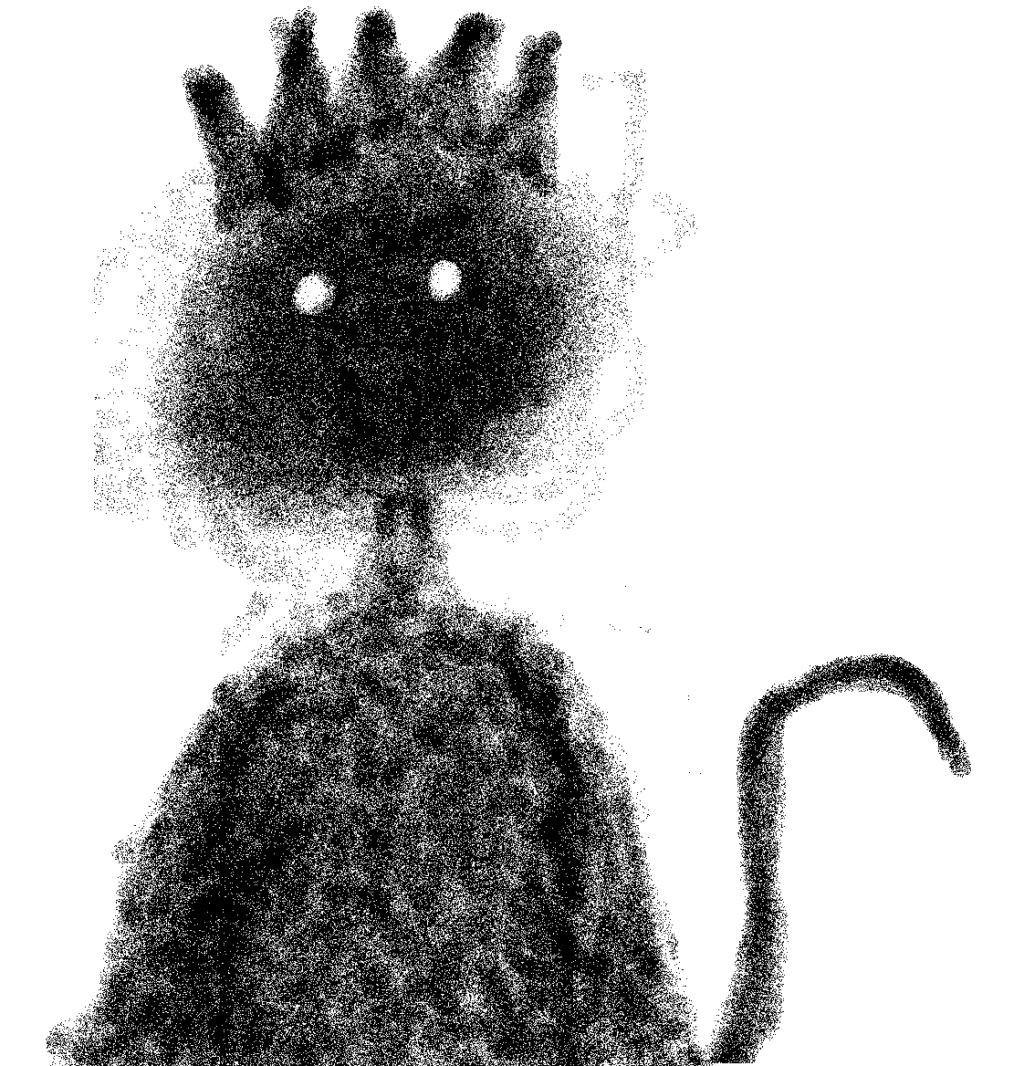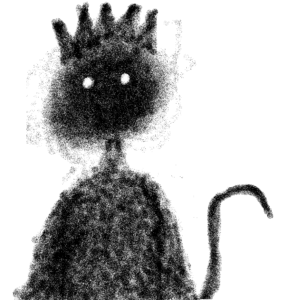
Dog Meat
 The following is a chapter from a work-in-progress novel, published here as part of our January “grimdark” theme, and because no higher, wiser editorial authority exists to stop me.
The following is a chapter from a work-in-progress novel, published here as part of our January “grimdark” theme, and because no higher, wiser editorial authority exists to stop me.
Dog Meat
The softness of my mattress is oppressive. If I try to sleep on my stomach or on my side—as I always did on my cot on the frontier—the feathers rise up around me, suffocatingly, and panic tells me that I am drowning in down. I’m tickled as I choke; half humiliated, half asphyxiated. So I lie on my back, and am startled awake during the night by the abrasive noise of my own snores—or, worse, I wake up panting and drooling, sure I’m being strangled, and feel death’s proximity slowly recede.
My mother, decades ago, when she was still alive, used to tell me, ad nauseum, the story of how one night, as a toddler, in the midst of a torrential rainstorm, I rolled restlessly away from her while we both slept and off our pile of straw. She found me, the next morning, face down, in a septic puddle. She thought I was dead, but I was fine. Only the water was grey. I don’t know if she told me this story as a cautionary tale, or a ritual incantation against future harm, or if her mouth was just another open cavity for anxiety’s winds to blow through. I miss that puddle. Dingy water can be spit out. Feathers stick to the back of your throat and have to be scrapped off, carefully, with a trimmed fingernail, while you gag.
I’ve been disfigured by insomnia. The hollows of my eyes are always dark now. Regal purple. Another sign of distinction. I’m exhausted and disoriented. In the dark, on my back, I’m sometimes unsure if I’m staring at an open door or a wall, at the ceiling or the inside of eyelids. I try not to think about coffins. Tonight, I fail.
A thing moves in the doorway. At first, the delicacy of its movements makes me think that it’s a cat, but the dogs lying around (and, in one case, on) the bed don’t stir. I experience a moment of irrational panic as I wonder if they’re all dead, if maybe they all died at once, the victim of toxic gas or mass poisoning, but my neck won’t cooperate with my desire to check to see if they’re breathing. I can’t raise my hand to touch the side of the one on the bed to feel it in- or ex- hale. I would call for one of them, but my mouth remains involuntarily clenched shut, and besides I stopped naming them decades ago, around the time my son was born, when I realized that it made it less painful to lose them.
The thing hasn’t left the doorway, but now it’s also in the room, near me. It has no shape, but it’s shaped like a man. It’s black. Invisible black. I know it’s the young king, though his face is featureless, though his face isn’t. Sometimes his tail twitches at the edge of my peripheral vision. He gets closer. He speaks. I don’t see a mouth.
“I loathe dogs.” His voice is effete, precise. He doesn’t moan or howl. Nothing clicks or rattles or scrapes. His words are as clear as he is opaque. I’m captivated. I’m captive. I listen.
“They’re dishonest, conniving, manipulative animals, parasitic on empathy. They’d rather cower and ingratiate than ask. They mime love and loyalty out of desperation, out of inbred neediness, because the only thing they understand about humans is how badly we want to be flattered and adored. They inuit our loneliness, blindly, and their pupils dilate.
“And yet the entire fucking time they are terrified of us, resent us. Look at their posture. Eyes down, stretching to bow, practically hunchbacked. Constantly vibrating with anxiety. Anticipating their next apology. I think I just heard that one moan in her sleep. Maybe she’s dreaming of catching you. Or a rabbit with your eyes. You snore and she hears its death rattle.”
I want to ask him if he has seen the soul of my son, if he knows if my wife is alive or dead, if one of them could visit me instead, but I cannot move, cannot speak. He pontificates, and I’m paralyzed.
“Have you ever been curious about the taste of dog meat? I tried to convince my chefs to organize a feast once. A dozen dogs of each known breed, at minimum. Ship them in from every corner of the kingdom. Import them from beyond our borders. Send trappers to all the frontiers to procure samples of breeds that have arisen naturally through feral miscegenation. Turn it into a festival. A pageant. A parade. Imagine the variety. No other animal had been bred into such a wide range of unique forms—and, presumably, flavors.”
He sits on my chest, and I feel his weight, even though he’s a ghost. My chest tightens. My lungs inflame. I hear his voice, my gasps. Both are clear, but don’t seem to coexist. They’re not in the same space. Different sounds from different worlds. But his ass is undeniably on me. I’m certain I’m dying.
“And don’t imagine an atrocity. Don’t think that there would have been red-eyed children in the streets, screaming for their abducted pups. Bitches whimpering as their bitches whimper. A black-armored soldier with a spear crouched beside every birthing hound, waiting to claim her firstborn for the king. Come on. The dogs could have been raised (and fattened) explicitly for the banquet table. I wouldn’t have sent delegates to people’s huts to impress their pets into royal service. It could all have been done dispassionately, bureaucratically. (I’d say ‘humanely,’ but break that word down and tell me what you hear.)”
As he sits on me, as he smothers me, he’s still standing next to me, still in the doorway. I can’t see the dog at my feet anymore. I should be able to see her, around the ghost, if not through him, but she’s not there, even though I feel her weight, just below my kneecaps.
“Nevertheless, my advisors told me there would be a revolt if I tried. Not among the serfs, mind you. It’s the aristocrats who would have cursed me in every language they’ve had the leisure to learn, who would have run me down with their hunting pack while I futilely covered myself with dead leaves and tried to mask my scent with a luckier animal’s piss. They would have devoured me. And, worse, they would have attached a moral to the meal. It would have become a ghastly fairytale, passed through the generations. The king who ate dogs. The king who was eaten by dogs.”
All of the dogs are gone now, and he sits on my legs in addition to my chest. I wonder if they all crawled under the bed to hide from him, but I saw nothing move, can see no movement at all. He’s getting heavier, but his tone is getting lighter, less spiteful, more comic. He loves to hear his own voice, loves that I can hear nothing else. The sound of my labored breathing is gone. I guess that I’m dead.
“Speaking of fairy tales, here is the lowest, most repulsive story that one man has ever told another: a peasant is starving, so he eats his dog. Reluctantly. You’ve heard it before, right? Probably with a few more maudlin details, tailored to fit the teller’s ulterior motives. A little more focus on the years they spent together, if he really wants to wring out the sobs. (How tough that meat must have been!) Or more time spent luxuriating over the direness of the peasant’s poverty, if he has a social point to make. Every culture in the world must have some version of this story. They don’t have a common language or folklore, and see different gods as they lay prostrate before a pillar of stones that their grandfathers stacked, but they all know about the poor, sad man who had dog for dinner. The one true universal myth. That’s how completely they’ve manipulated us. They’ve made dog stew our only shared taboo. There are probably cannibals, with trepanated skulls and the skin of their cousins still between their teeth, who wipe their dirty, inflamed eyes at the thought of the man who had no choice but to cook his terrier.”
I know I’m alive because I can feel his tail tickling my nose. I want to sneeze, can’t. Need to sneeze, can’t. Pray to sneeze, can’t. Would rather die sneezing than live anticipating the sneeze, can’t. I’m in agony. He continues.
“I concocted hundreds of versions of this story. I would tell them to the servants, to the men and ladies of the court, to children, under the pretense that this was a true story I had heard—which is always how anyone tells it, regardless of how truthful they are elsewhere in their lives—and I’d watch them. I’d see how they reacted. How many of them I caught watching me in return, trying to give me the response I wanted, hungry to curry favor. (Dogs. Dogs. Dogs. Salivating.) But so many of them cried. Authentically. Indisputably. Passionately. Blubbering. Wheezing. Snotty. Vile. And then I would laugh, and tell them that it was all a joke, that I was playing with them. The peasant spared his dog, and ate his son instead.”
My tongue rises to the roof of my mouth and finds a feather. The ghost vanishes. I can move again. All of the dogs are still here. All of the dogs are still breathing.